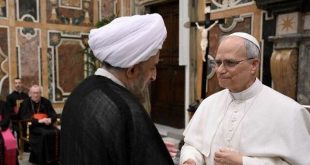The martyr, knowingly and sincerely, assists the truth and invades the falsehood and puts his life in danger and therefore, martyrdom is considered the highest and the most honored type of death.
According to Islam, all human beings live after death and no one will be annihilated. In the early days of Islam, because of the insufficient understanding of the life in the intermediary world (Barzakh), some considered martyrdom a form of destruction, failure, and deprivation. The answer of the Holy Qur’an was that human beings seek life and their main life is after death, so sacrifice and martyrdom are the grounds for attaining eternal life and salvation from destruction and inexistence.
The Holy Qur’an says about the martyrs:
وَ لا تَحْسَبَنَّ الَّذينَ قُتِلُوا في سَبيلِ اللَّهِ أَمْواتاً بَلْ أَحْياءٌ عِنْدَ رَبِّهِمْ يُرْزَقُونَ
Do not suppose those who were slain in the way of Allah to be dead; rather they are living and provided for near their Lord. (The Holy Qur’an, 3:169)
Prohibiting from using the word “dead” to refer to the martyrs repels both the illusion of destruction and the illusion that they are ineffective. The martyr is alive and effective, awakening and enlightening the people of the world and bringing spirituality and joy to the people of the Hereafter. So, they have a higher life.[1] Many people might not perceive and understand the nature of the life of the martyrs, but this does not mean that such life is impossible.
Also, in other verses, the illusion that martyrdom can lead to deprivation and failure of the martyr has been rejected by the martyr’s benefit from special sustenance in God’s presence. The martyr, knowingly and sincerely, assists the truth and invades the falsehood and puts his life in danger and therefore, martyrdom is considered the highest and the most honored type of death. The Holy Qur’an refers to a special sustenance for the martyrs especially for those who are killed or die in the way of supporting the religion of God and emigration to acquire divine knowledge, whether moving to the battlefield or scientific migration and the like:
وَ الَّذينَ هاجَرُوا في سَبيلِ اللَّهِ ثُمَّ قُتِلُوا أَوْ ماتُوا لَيَرْزُقَنَّهُمُ اللَّهُ رِزْقاً حَسَناً وَ إِنَّ اللَّهَ لَهُوَ خَيْرُ الرَّازِقينَ
Those who migrate in the way of Allah and then are slain, or die, Allah will surely provide them with a good provision. Allah is indeed the best of providers. (The Holy Qur’an, 22:58)
All of them may not be called “martyr” and their jurisprudence verdict is not the same with regard to the ritual bath (ghosl) and the shroud; however, all of them are the same in terms of merit and achieving good pure sustenance, though their degree might be different.
Martyrdom from Shia Perspective
Martyrdom has a high status for the Shia.The eleven Shiite infallible Imams have all been martyred and none have died by natural death.[2]The first Imam of the Shiites, Imam Ali ibn Abi Talib (AS), when injured, said: “By the God of the Ka’ba! I reached salvation!”[3]One of the famous titles of Imam Husayn (AS) is “Sayyid al-Shuhada (Master of the Martyrs)”. Also, according to narrations, the martyrs are cleansed of all sins as soon as they are martyred.[4]
After the prophets and scholars, the right to intercede comes to the martyrs, so they can intercede for others before God Almighty.[5]The following narrations also show the high status of the martyrs according to the Ahlul Bayt (AS):
- Martyrdom in God’s way is the highest form of death.[6]
- The Holy Prophet (PBUH) said: “There is goodness above every goodness, until one is slain in the cause of God, beyond which there is no better goodness”.[7]
- The Prophet (PBUH) also said: “God forgives all of a martyr’s sins by the first drop of the his blood.”[8]
- The Prophet (PBUH) also said: “No drop is more beloved for God than the drop of blood that is shed in God’s way.”[9]
It is also worth mentioning that visiting the tombs of Imam Husayn, as well as other martyrs of Karbala, is highly recommendation.[10]Such is the case for the graves of all martyrs.[11]
The Article was written by Hujjat al-Islam Sayyid Mostafa Daryabari and Dr. Morteza Karimi.
————————————————————————
References:
- The Holy Qur’an
- Allama Majlisi, Bihar al-Anwar, Al-Wafa’ Institute, Beirut, 1404.
- Huwayzi, Abd Ali, Nur al-Thaqalayn, Isma’iliyan Publication, Qum.
- Najafi, Muhammad Hasan, Jawahir al-kalam, Beirut, 1412.
- Shaykh Hurr al-Amili, Wasa’il al-Shi‘a, Al al-Bayt Institute, Qum, 1409.
- Tabarsi, Fazl b. Hasan, Majma‘ al-Bayan fi Tafsir al-Qur’an, Naser Khosrow Publication, Tehran, 1372.
- Tabataba’i, Sayyid Muhammad Husayn, al-Mizan fi Tafsir al-Qur’an, Jame’e-ye Mudarrisin, Qum, 1417.
[1]Tabarsi, Fazl ibn Hasan, Majma‘ al-Bayan fi Tafsir al-Qur’an, vol. 2, p. 439; Tabataba’i, Sayyid Muhammad Husayn, al-Mizan fi Tafsir al-Qur’an, Vol. 4, pp. 60-62.
[2]Bihar al-Anwar, vol. 27, p. 217.
[3]Bihar al-Anwar, vol. 42, p. 239.
[4]Nur al-Thaqalayn, Vol. 1, p. 517.
[5]Bihar al-Anwar, vol. 100, p. 12.
[6]Wasa’il Al-Shi’a, vol. 15, p. 14.
[7]Wasa’il Al-Shi’a,vol. 15, p. 17.
[8]Wasa’il Al-Shi’a,vol. 15, p. 16.
[9]Wasa’il Al-Shi’a, vol. 15, p. 14.
[10]Wasa’il Al-Shi’a, vol. 14, p. 409.
[11]Wasa’il Al-Shi’a, vol. 12, p. 352; Jawahir al-kalam, vol. 20, pp. 103,107.
 Ijtihad Network Being Wise and Faithful Muslim in the Contemporary World
Ijtihad Network Being Wise and Faithful Muslim in the Contemporary World
